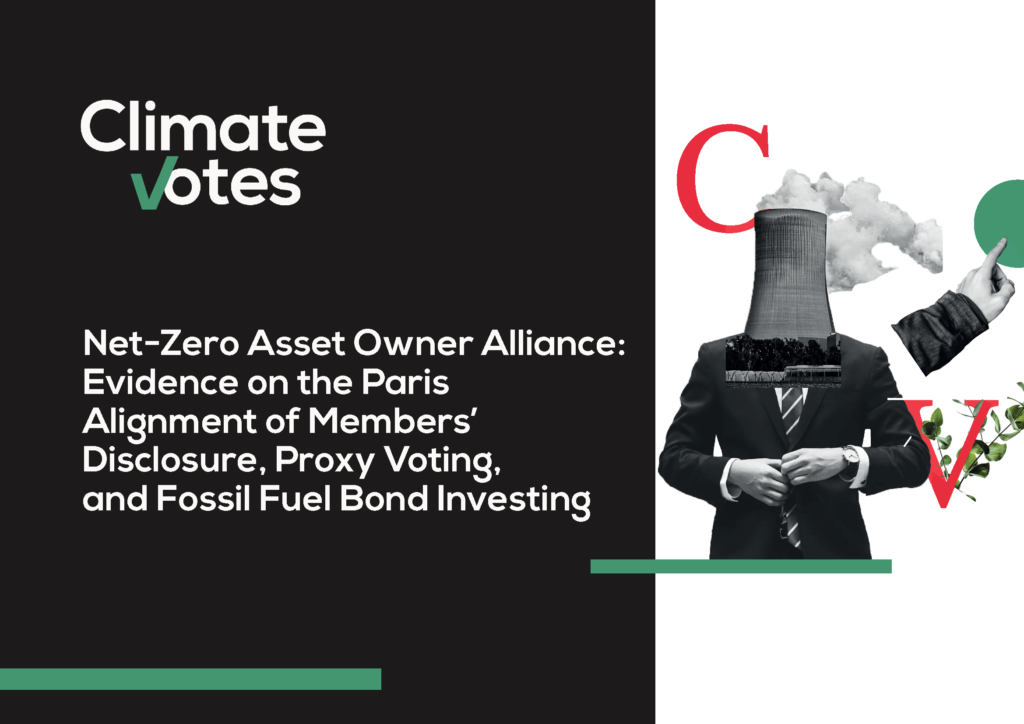A report published by Climate Votes examines the Net Zero Asset Owners Alliance (NZAOA) members’ disclosure, proxy voting and fossil fuel bond investing. The ‘Net Zero Asset Owners Alliance’ covers more than ten trillion USD worth of assets, with the 74 members promising to align activities with strong climate action. However, this analysis reveals a litany of missed opportunities.
The report, commissioned by The Sunrise Project and authored by the University of Edinburgh and SDG Labs, examines climate disclosure practice in publicly issued statements and reports; climate voting performance by comparing Principles for Responsible Investing (PRI) signatories with NZAOA peers; fossil fuel bondholding behaviour through proportionality analyses using Bloomberg data. In each category, members tend to fall short, despite their commitments to aligning with the goals of the Paris Climate Agreement.
The report has three crucial findings:
- Seven members of the NZAOA own more fossil fuel company bonds than Vanguard, an average market benchmark with no climate considerations, and approximately 75% of members have some exposure to fossil fuel bonds.
- Non-members of the NZAOA are, shockingly, more likely to vote in favour of Paris-alignment than members.
- Only 26% of members disclose information relating to emissions they enable external to their corporation (‘Scope 3 emissions’).
Findings on fossil fuel bond investing
- Seven members hold more bonds issued by fossil fuel companies in the BICS Industry Classification list than Vanguard – an average market holdings benchmark with no focus on sustainability and climate change.
- Approximately 75% of members have some exposure to fossil fuel bonds
- St James’s Place and Dai-ichi Life’s proportion of holdings in fossil fuel companies’ bonds were nearly twice as much as that of the cohort’s average (2.96 times and 2.69 times, respectively).
- A similar distribution is observed for NZAOA members holding bonds in the Toxic Bonds Dirty 30 list of fossil fuel expansionist companies. St. James’s Place topped the table in terms of proportional fossil fuel bond holdings, with 6.26 times more than that of Vanguard. Second place was Nippon Life Insurance Group. Nippon’s proportion of fossil fuel bond holdings is 8.7%, or 5.23 times as much as that of Vanguard Group (1.7%).
- In comparison with the cohort’s average proportion of 1.3%, St. James’s Place and Nippon Life Insurance’s proportion of fossil fuel bond holdings were, respectively, 8.12 and 6.77 times higher.
Fossil fuel bond recommendations
- Fully and publicly disclose aggregate corporate bond holdings and Scope 1, 2, and 3 emissions associated with these holdings by industry sector code.
- Deny new bonds for any fossil fuel company that is expanding output or infrastructure.
- Reduce current exposure to fossil fuel bond holdings, unless the company stops expansion and implements a complete phase-out strategy aligned with principles of equity and a 1.5˚C timeline certified by globally recognized, science-based professionals.
- Apply innovative net-zero benchmarks, such as the EU’s Paris-aligned benchmarks, which reduce the portfolio’s year-over-year exposure to fossil fuels.
